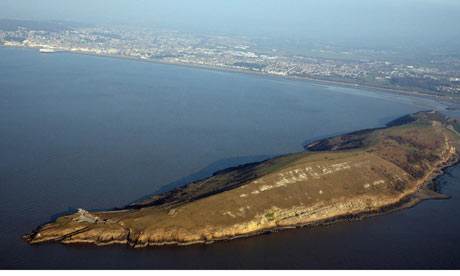
The Weston barrage, running 10 miles across the Severn estuary between Weston-super-Mare and Cardiff, is the largest of four tidal power schemes being considered by government Photograph: Matt Cardy/Getty Images
A giant tidal energy scheme which the government is counting on to meet ambitious new green energy targets set this week should not be built because it would be so ecologically destructive, the chair of the Environment Agency has warned ministers.
The government's roadmap to a low-carbon UK called for a 34% cut in emissions by 2020, with the power sector contributing the bulk of that saving. The Weston barrage, running 10 miles across the Severn estuary between Weston-super-Mare and Cardiff, is by far the largest of four tidal power schemes being considered by government and would be the centrepiece of the nation's renewable energy plan.
It could generate 8.6 gigawatts of zero-carbon electricity from the Severn – the equivalent of eight large coal-fired power stations – and would be the single largest renewable energy project in Europe.
But the £5bn flagship scheme would permanently flood nearly 35,000 hectares (86,000 acres) of internationally protected wetlands. It would also destroy some of Britain's most important fisheries in the Severn, Wye and Usk catchment areas, said Lord Smith in an interview with the Guardian.
"The great wall across the Severn channel poses the classic environmental dilemma. It would generate 5% of all the UK's electricity needs but at a huge cost in terms of fishing and habitats. These immense environmental impacts outweigh the carbon reduction benefits which you would get. We are advising the government on this pretty strongly," said the government's chief environmental adviser.
"There must be ways of harnessing tidal power from the estuary without the gross impacts that the Weston scheme would have. I regret that we are not putting as much effort as we could into tidal reefs and defences. We should be addressing the possibility of tidal power around the country. Tidal energy should be one of the key ways of generating electricity", he said.
Smith's comments will not be welcomed by the government which this week committed itself to generating 20% of the UK's energy from renewable sources within only 11 years, but it is meeting technical and planning delays with wind power.
A decision on the barrage will be given next year but ministers are keen to see it started because it would contribute more to emission cuts than any other scheme. The energy minister, Lord Hunt, said this week: "The Cardiff-Weston barrage has the potential to save the equivalent of the yearly CO2 emissions from all homes in Wales."
The barrage, which would be a huge engineering feat on the scale of some of the world's biggest construction projects, is shaping up to be one the most contentious environmental issues of the decade. The National Trust, the RSPB and WWF, together representing more than 5 million people, have said that a barrage would be "economically dubious" and "ecologically disastrous".
They have also argued that 5m tonnes of CO2 would be emitted during construction and another 5m tonnes during transport of the materials, undermining claims that the barrage would help reduce emissions.
Smith also warned the nuclear industry, another part of the energy and climate change secretary, Ed Miliband's "trinity" of low-carbon electricity plans, that climate change could seriously affect their costs. He said the agency would demand that nuclear power companies build major sea defences to protect nuclear power against the sea level rises expected over the next 100 years.
"Virtually all the new [nuclear] stations are by the sea. We will look at them on a case-by-case basis but all sites must be fully defensible. The power companies know that they will have to defend them on a very large scale. Protection against flood risk must be absolute."
Smith also questioned Miliband's intention to preserve low-cost mass air travel, revealed in the Guardian this week. Calling for a debate on the future of aviation, he argued that climate change made it doubtful people could fly so much in 40 years' time. "By 2050 we should have reduced greenhouse gases by 80%, which means we will have 20% left. How much of that 20% should be taken by aviation?
"Aeroplanes will get more efficient but they will not be able to completely remove their carbon emissions. By 2050 we will need to have decided how much flying we can do. "



No comments:
Post a Comment